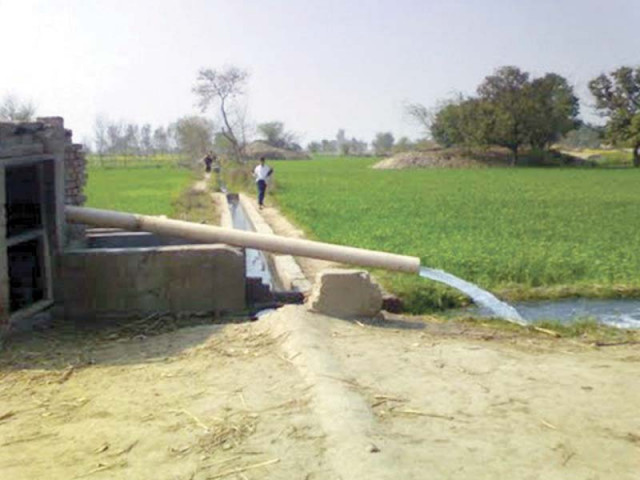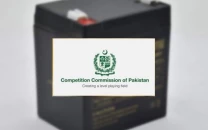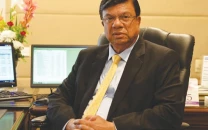Solar power: Dawood Group’s Reon eyes tube-well project
Awaiting clarity on methodology of replacing old tube-wells

The government plans to arrange total loans of estimated Rs30 billion in the next three years considering the cost of solar equipment for each tube-well at Rs1.1 million. PHOTO: FILE
The government has yet to come up with a mechanism to put into action its budget scheme of disbursing interest-free loans among small farmers that would be used to fund solar powered tube-wells, a top industry official said.
The scheme, which was announced by Finance Minister Ishaq Dar in his budget speech for fiscal year 2015-16, foresees conversion and installation of 30,000 solar tube-wells over a period of three years.
“We are still waiting for clarity on this matter. As per our discussions with government officials, we have been told that Ministry of Science and Technology will spearhead this project,” said Inamur Rahman, the CEO of Reon Energy Solutions.
Read: Cutting Costs : Street lights going solar
“Personally, I am not sure what this particular ministry has to do with all this. We are also being told that provinces will contribute equivalent funds for the scheme. So these issues need to be sorted out.”
But he insists that the scheme implemented properly would be a “game changer”.
According to Dar, replacing diesel- and electricity-run tube-wells with solar panels will help farmers save Rs1,660 and Rs466 a day, respectively, assuming they use them to fetch water for five hours.
The government plans to arrange total loans of estimated Rs30 billion in the next three years considering the cost of solar equipment for each tube-well at Rs1.1 million and initial deposit of Rs100,000, which farmer have to arrange.
Read: Norwegian firm to set up three solar power plants in Pakistan
Farmers with landholding of up to 12.5 acres are eligible for the scheme.
From textiles to renewables
Reon, which is a subsidiary of Dawood Lawrencepur Limited (DLL), is one of the few companies well positioned to tap on this investment opportunity.
CEO Rahman believes the company might be able to grab a share of 20% to 25% of this government-sponsored scheme.
“We have a B2B (business to business) model. So basically we are EPC (engineering, procurement and construction) contractors,” he said. “We were catering to households as well but we pulled out of that market. Time is not ripe for that right now.”
Reon already has a three-year $30-million contract with Telenor to install solar equipment at 5,000 base transceiver station towers in Pakistan and Bangladesh. The 7.2 kilowatt systems help cellular companies save on electricity cost. “This is especially useful for BTS towers located in far-flung areas which are expensive to connect to the power grid.”
DLL, which in turn is a subsidiary of Dawood Hercules Corporation, used to be a leading textile company with factories in Burewala and Karachi.
But over the years the textile business was shut down and DLL was restyled to become a holding company for Dawood’s renewable energy.
Besides Reon, under its umbrella is Tenaga Generasi Limited, which is setting up a 50mw wind turbine farm. Rahman also heads this division. “As a group, we are focusing a lot on energy where we have deep expertise,” he said, referring to Hub Power Company and Engro Powergen, which are both part of Dawood Group.
Reon is not considering industrial level solar power projects and has instead positioned itself as a small scale project executioner.
Read: Quaid-e-Azam solar project: PM orders completion of project by April
“We have helped develop vendors and local suppliers. That has not only cut project cost but groomed us to undertake future projects efficiently.”
Published in The Express Tribune, July 15th, 2015.
Like Business on Facebook, follow @TribuneBiz on Twitter to stay informed and join in the conversation.


















COMMENTS
Comments are moderated and generally will be posted if they are on-topic and not abusive.
For more information, please see our Comments FAQ